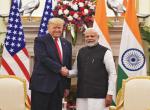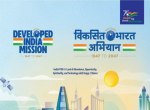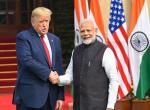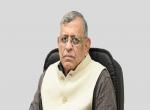On 30 October, 2024, Botswana, the continent’s longest-serving democracy held its presidential elections. The contest for power was fought between the country’s ruling Botswana Democratic Party (BDP) led by President Mokgweetsi Masisi, and the opposition, Umbrella for Democratic Change (UDC). The election results paved the way for a historic win for the UDC, led by the Harvard-educated lawyer, Duma Boko. The ousting of the BDP, which ruled the country for 58 years, reflects public discontent and disarray within the party. It also shows the party's inability to handle the country's long-standing challenges.
According to the latest United Nations data, Botswana is a landlocked, sparsely populated country with only 2.5 million people. [1] It is a resource-rich country with the world’s second-largest diamond reserves and largest elephant population. Sir Seretse Khama, independent Botswana’s first president, and his pragmatic policies contributed to making it an economically and politically stable country. A joint venture between the Government of Botswana and De Beers Company, the largest mining giant in the world, catapulted its economy towards growth and development. The profits made from diamond production were reinvested in education, health, and infrastructural development.
Botswana in the late 1990s took certain steps to reduce its dependence on South Africa and take the reins of economic growth into its own hands. It co-established the South African Development Community (SADC) and established its currency, the Pula, rejecting the South African Rand.
Despite economic progress, the political landscape of Botswana remained dubious with power being concentrated in the hands of the Botswana Democratic Party (BDP) for over 50 years. Things began to go downhill after Mokgweetsi Masisi became the president in 2018. He took several controversial decisions such as lifting the ban on elephant hunting. This decision received considerable international criticism. Though the country is highly reliant on the diamond mining sector for maintaining the GDP, employment generation from this sector has been negligible. The fall in demand for diamonds in the international market added to the misery as 80 percent of its revenue came from diamond exports.[2] In the wake of massive unemployment and economic uncertainty, the discontented people of Botswana began to demand a new government that would remedy this situation. The 2024 election result is reflective of this mandate.
The new president, Duma Boko has a mammoth task before him. Taking the country out of the ongoing economic stagnation would require an action plan. First and foremost, he needs to address the downturn in the diamond industry and rework the terms of the partnership with De Beers Company. Earlier in 2023, the government under then-president, Mokgweetsi Masisi secured an agreement for a larger share of diamond sales to enhance economic diversification within the industry. [3] President Boko now has to rework and finalise the terms of this agreement in the wake of the dropping of diamond prices and demand globally. Another looming challenge he has to address is Botswana’s high rate of unemployment which stands at 27 percent at present. [4] This can be dealt with mainly by restructuring and diversifying the economy as well as by venturing into other areas such as tourism, skill development, information and technology (IT), and overall infrastructural development to create jobs and reduce poverty.
The Prime Minister of India, Narendra Modi congratulated the new President and expressed his keenness to strengthen bilateral ties with the nation. India and Botswana have had strong bilateral ties with common areas of collaboration including trade, investment, diaspora, and sustainable development. With the shift in political regime, India should also aim to explore new areas for collaboration with the country.
Both India and Botswana share the joint ambition of being a digitally driven economy and aiming for enhanced cooperation in this area could be the way forward. Although a well-established national broadband strategy exists in Botswana, it lacks adequate implementation. [5] There is also a need to develop a robust digital financial sector with one national identity that could be digitally accessed by mobile operators and financial services. Here, Botswana can learn a lot from India’s Unified Payments Interface (UPI) to fast-track the process of financial inclusion and development of Digital Financial Services (DFS) across the country.
Food security could be another area of potential cooperation. About 70 percent of Botswana’s landscape is made up of desert and poor-quality soil which contributes significantly to food insecurity. [6] According to the World Food Programme (WFP), food security is a major challenge in Botswana with 22 percent of the population experiencing moderate or severe food insecurity. The country must use innovative means to make itself food secure. It can benefit from India’s expertise, particularly its experience with the Green Revolution and the integration of the digital landscape with agricultural sector which India successfully managed to achieve through the Digital India Mission which brought the internet to rural areas. The farmers vis-a-vis various educational platforms are regularly updated about new agricultural techniques around the world to combat food insecurity and enhance food production.
In the areas of capacity building and healthcare, India and Botswana have established a good relationship [7] Around 1000 candidates from Botswana were given training and awarded scholarships under Indian Council for Cultural Relations (ICCR), Indian Technical and Economic Cooperation (ITEC) and IAFS (India-Africa Forum Summit) platforms. India supports Botswana in the healthcare sector by exporting affordable medicines and would continue strengthening relations in this area.
India's economy also stands to benefit immensely from the collaboration between Botswana’s mining company and India’s processing industry. This would create jobs for the Indian youth and also ensure a steady flow of semi-precious stones, copper, ores, ash, and other raw minerals to India. Botswana will also benefit given the current downturn in diamond demand in China and USA. Botswana’s tourism industry suffered a setback during the Covid-19 pandemic. The time is now conducive to revive the travel sector and attract tourists from India. Similarly, India can attract tourists from Botswana given its rich cultural heritage. This would not only boost the economic sphere but also strengthen diplomatic ties between the two countries.
Given the importance of climate change in the contemporary world, a significant area of collaboration is renewable energy. India being the founder of the International Solar Alliance (ISA) could tap into Botswana’s solar energy potential and develop solar energy projects on a partnership basis. This would help both countries not just to strengthen their bilateral ties but also contribute to achieving sustainable development goals.
The 2024 election is a turning point for Botswana as it allows the country to rethink its development path. Though the new government is confronted with economic challenges culminating from the downturn in the diamond industry, the efforts that this government makes will be crucial for ensuring transparency and accountability in the administration; a significant component for building public trust and confidence. Prime Minister’s congratulatory message to the new President signifies the heralding of a new beginning for India, the world’s largest democracy and Botswana which has had a history of being the longest-serving democracy in the continent. The time has now come for Botswana to reassert itself and become a role model for the other African countries.
References
[1]The World Bank in Botswana, World Bank Group, 17 October, 2024 at https://www.worldbank.org/en/country/botswana/overview (Accessed November 22, 2024).
[2]Keith Jefferis, “Management of Botswana’s Diamond Revenues” IMF PFM Blog, 8 July, 2024 at https://blog-pfm.imf.org/en/authors?author=Keith%20Jefferis (Accessed November 23, 2024).
[3]Anthony DeMarco, “De Beers and Botswana Agree to A 10-Year Diamond Sales Deal” Forbes, 21 July, 2024 at https://www.forbes.com/sites/anthonydemarco/2023/07/01/de-beers-and-botswana-agree-to-a-10-year-diamond-sales-deal/ (Accessed November 24, 2024).
[4]Botswana: 2024 Article IV Consultation-Press Release and Staff Report, International Monetary Fund (African Dept.), 10 September, 2024 at
https://www.elibrary.imf.org/view/journals/002/2024/286/article-A001-en.xml (Accessed November 25, 2024).
[5]At a Crossroads: Reigniting Efficient and Inclusive Growth, Botswana-Systematic Country Diagnostic Update, World Bank Group, November 20, 2023 at
https://documents1.worldbank.org/curated/en/099112023112034378/pdf/BOSIB056106b900660a7d8068fe9cad99f2.pdf (Accessed November 22, 2024).
[6]Food Security Update, World Bank Group, 18 November, 2024 at https://www.worldbank.org/en/topic/agriculture/brief/food-security-update (Accessed November 22, 2024).
[7]India-Botswana Relations, Ministry of External Affairs, December 2022 at https://www.mea.gov.in/portal/foreignrelation/india-botswana_relations.pdf (Accessed November 25, 2024).
(The paper is the author’s individual scholastic articulation. The author certifies that the article/paper is original in content, unpublished and it has not been submitted for publication/web upload elsewhere, and that the facts and figures quoted are duly referenced, as needed, and are believed to be correct). (The paper does not necessarily represent the organisational stance... More >>
Image Source: https://timesofindia.indiatimes.com/world/rest-of-world/botswana-heads-to-the-polls-with-diamond-downturn-in-focus/articleshow/114753838.cms











Post new comment